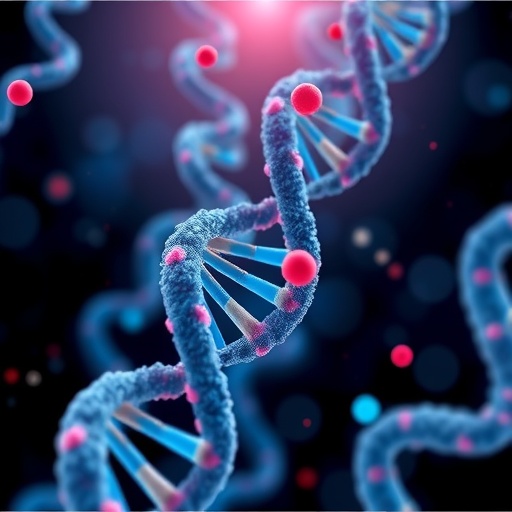Unlocking the genetic secrets of diseases that have haunted humanity for decades has long been a formidable challenge for medical researchers. Critical clinical samples, often preserved in medical archives, house invaluable DNA that could illuminate shifts in disease patterns and origins. Yet, intrinsic to the molecular fabric of life, DNA is inherently fragile, and over time, especially beyond 20 years, its integrity deteriorates, rendering conventional genetic analysis techniques largely ineffective for these older samples.
The advent of cutting-edge genomic technologies has dramatically revolutionized modern clinical genetics, enabling comprehensive insights into contemporary disease states with unprecedented resolution. However, these technologies have predominantly been applied to fresh or recently collected genetic material, leaving a vast reservoir of older clinical specimens largely untapped. This limitation curtails our ability to dissect the historical genomic landscape of diseases and understand how genetic factors influencing disease susceptibility have evolved over extended periods.
Harnessing a novel approach inspired by methodologies pioneered in the field of ancient DNA research, scientists at the University of Chicago have adapted sophisticated techniques to robustly recover and sequence degraded DNA from formalin-fixed, paraffin-embedded (FFPE) medical samples dating back nearly a century. This approach bridges the gap between molecular archaeology and modern medical genomics, enabling exploration of genetic changes in tumor biology across decades.
The research was unveiled in a forthcoming presentation at the prestigious Association for Molecular Pathology (AMP) 2025 Annual Meeting & Expo in Boston, a gathering of leading molecular diagnostic experts aimed at pushing the boundaries of disease understanding through genomic science. The team meticulously selected colorectal cancer samples spanning an extraordinary temporal range—from 1932 to 2023—to investigate evolving genetic landscapes and microbial constituents within tumor microenvironments.
Colorectal cancer’s increasing incidence among younger adults, a demographic historically at lower risk, poses a perplexing epidemiological enigma. Contemporary statistics reveal a troubling trend: a 35-year-old today faces twice the likelihood of developing colorectal cancer compared to their counterpart in 1985. A comprehensive temporal genomic analysis promised to shed light on potential genetic drivers underpinning this shift.
Retrieval of actionable genetic material from the FFPE specimens required precise optimization of DNA extraction techniques. The research team innovatively fine-tuned steps for meticulous removal of paraffin wax and chemical preservatives—agents known to complicate nucleic acid recovery. Their tailored protocols maximized yield of usable DNA fragments, a critical and delicate step given the high degree of DNA fragmentation typical of archival tissue samples.
To reconstruct meaningful genomic data from these fragmented strands, the researchers employed a bespoke bioinformatics pipeline rooted in digital tools originally designed to handle ancient DNA. These tools adeptly aligned damaged and incomplete sequences with the human reference genome, overcoming challenges associated with post-mortem DNA damage such as cytosine deamination and strand breaks, allowing for accurate genetic variant calling in an otherwise challenging data landscape.
The pipeline incorporated whole-genome sequencing complemented by a targeted gene-enrichment strategy focusing on a panel of oncogenes and tumor suppressor genes relevant to colorectal cancer (using the OncoPlus panel). Crucially, protocols were modified to preserve ultra-short DNA fragments, which are traditionally discarded during library preparation, ensuring the recovery of maximum genomic information from severely degraded samples.
Beyond human genomic data, the team probed the metagenomic component embedded within the tumor tissues. Analysis of non-human DNA sequences revealed presence not only of commensal gut microbiota but also specific bacterial species previously implicated in colorectal carcinogenesis. This innovative inclusion reveals the multifaceted nature of tumor microenvironments, where microbial constituents may influence oncogenic processes and disease progression.
Dr. Alexander Guzzetta, M.D., Ph.D., leading the initiative alongside ancient DNA expert Maanasa Raghavan, Ph.D., remarked on the groundbreaking nature of this dual genomic and microbial analysis. He emphasized the significance of detecting cancer-associated bacterial species retrospectively across decades, a window that could elucidate shifts in tumor microbiomes and their potential role in the epidemiological transition of colorectal cancer.
The implications of this research extend far beyond colorectal cancer. The demonstrated capacity to recover and decipher genetic information from long-preserved clinical samples paves the way for retrospective analyses of numerous diseases. Guzzetta envisions a future where molecular historians of medicine can unravel the genomic evolution of infectious pathogens, inherited disorders, and cancer types with temporal depth previously unattainable.
Fundamentally, this methodology offers an unprecedented tool for molecular epidemiology and evolutionary pathology, bridging the gap between historic medical archives and cutting-edge genomic science. The ability to track genetic mutation patterns, microbial interactions, and disease susceptibility shifts longitudinally could revolutionize disease prevention, diagnosis, and treatment paradigms.
The team’s work will be highlighted in both a platform presentation and poster session at the AMP 2025 event, scheduled for November 13 at the Thomas M. Menino Convention and Exhibition Center in Boston. Guzzetta will be available to engage with the scientific community and media to discuss the technical intricacies and transformative potential of this research.
As attention turns increasingly to the dynamic interplay between human genetics, microbiomes, and disease, this pioneering approach heralds a new era where historical genetic data fragments, once lost to time, become key to unlocking medical mysteries of the past, present, and future.
Subject of Research:
Advancements in sequencing degraded genetic material from archival medical samples to study disease evolution, with a focus on colorectal cancer genetics and tumor microbiomes.
Article Title:
Decoding Nearly a Century of Cancer Genomics: Ancient DNA Techniques Revitalize Colorectal Tumor Analysis
News Publication Date:
2025 (Ahead of AMP 2025 Annual Meeting & Expo)
Web References:
Association for Molecular Pathology 2025 Annual Meeting & Expo
Keywords:
Pathology, Disease susceptibility, Ancient DNA, DNA damage, DNA, Genetic material, Genetic analysis, Colorectal cancer, Colon cancer
Tags: ancient DNA research techniquesclinical specimen analysisdegraded DNA recovery methodsDNA analysis innovationevolving disease patterns over timeformalin-fixed paraffin-embedded samplesgenetic factors in disease susceptibilitygenomic technologies in medicinehistorical disease evolution insightsmedical genetics advancementstransformative genomic researchunlocking medical archives





